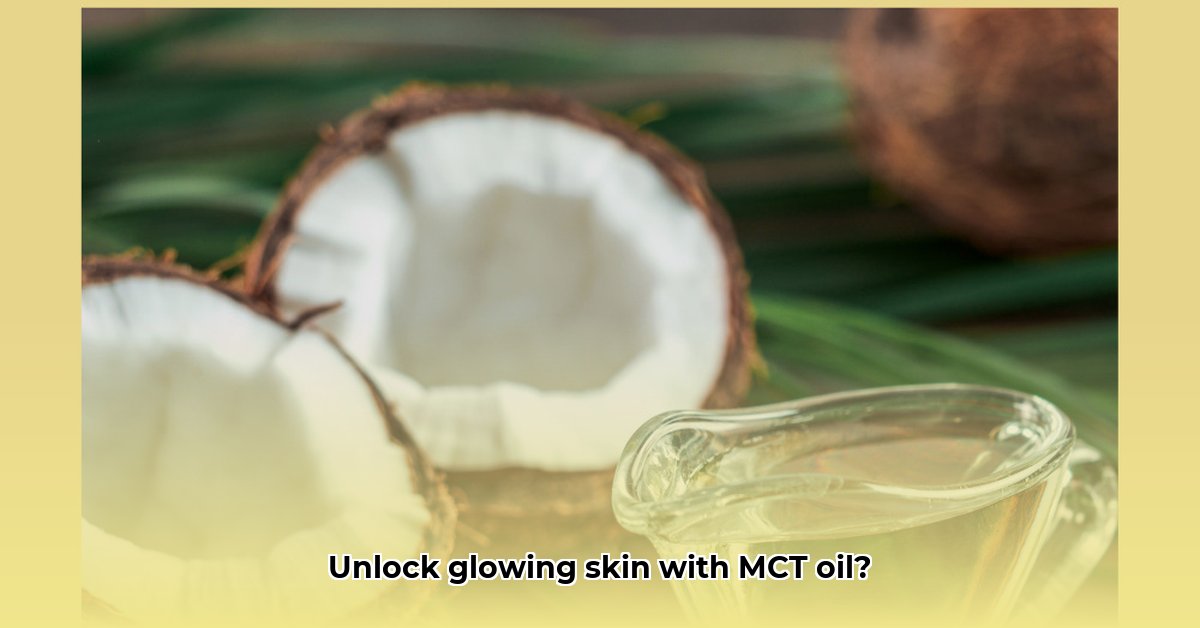
Benefits of MCT Oil for Skin: A Detailed Look
Want radiant, healthy skin? Medium-chain triglyceride (MCT) oil, often touted for its potential skincare benefits, warrants a closer look. This article explores the purported advantages, limitations of current research, and safe application methods. We'll emphasize evidence-based information, acknowledging the need for further scientific investigation.
Understanding MCT Oil and Its Composition
MCT oil, primarily composed of caprylic acid and capric acid (medium-chain fatty acids), is easily absorbed by the skin. While anecdotal evidence and some pre-clinical studies suggest benefits, robust human clinical trials are needed to confirm its efficacy. This means we should temper our expectations and prioritize cautious use.
Potential Skin Benefits: A Balanced Perspective
Several potential benefits are associated with MCT oil for skin:
Hydration: MCT oil's small molecular structure may allow for better penetration and improved skin hydration. However, human studies are limited, and the extent of this benefit remains unclear. Does MCT oil truly enhance skin moisture levels consistently? Further research is needed to confirm this.
Anti-inflammation: Caprylic acid, a key component of MCT oil, exhibits anti-inflammatory properties in some in-vitro (test-tube) and animal studies. This suggests a potential role in soothing skin conditions like eczema or psoriasis; however, more human trials are necessary to validate these findings. Can we confidently recommend MCT oil for inflammatory skin conditions? Not yet.
Antimicrobial Properties: Some research points to caprylic acid's ability to combat acne-causing bacteria, like Cutibacterium acnes. This antimicrobial action could potentially improve acne-prone skin. But again, this is mainly based on in-vitro studies, and the effectiveness of topical MCT oil application in humans requires further investigation. Is MCT oil an effective acne treatment? The evidence is currently insufficient to make this claim.
Addressing Research Limitations: The Need for More Data
Many studies supporting MCT oil's purported benefits rely on cell cultures or animal models. While informative, these don't fully translate to human skin's complex responses. Large-scale, randomized, controlled human trials are urgently needed to establish the efficacy and safety of MCT oil for various skin conditions. The lack of standardized application protocols (concentration, frequency, duration) further complicates the interpretation of existing data. We need more conclusive evidence to support widespread claims.
How to Use MCT Oil for Skin: A Step-by-Step Guide
If you're still interested in trying MCT oil, follow these steps:
Patch Test: Before applying to your face, perform a patch test on a small area of skin (inner arm) to check for any allergic reactions. Wait at least 24 hours to observe for redness, itching, or swelling. This simple precaution can prevent potentially unpleasant surprises.
Cleanse and Dry: Apply MCT oil to clean, dry skin for optimal absorption.
Start Slowly: Begin with a very small amount. You can always add more, but it’s easier to start conservatively.
Gentle Application: Gently massage the oil into your skin using upward circular motions.
Monitor Your Skin: Observe your skin's response closely. If you experience any irritation or adverse reactions, immediately discontinue use.
Potential Risks and Side Effects
While MCT oil is generally considered safe, mild allergic reactions (redness, itching) are possible. The lack of long-term studies on topical application means we don't fully understand potential long-term effects. If skin irritation develops, cease use and consult a dermatologist.
Conclusion: A Cautious Approach to MCT Oil for Skin
The potential skincare benefits of MCT oil remain an exciting area of research. Although early findings suggest possible advantages, more rigorous human clinical trials are needed before definitive conclusions can be drawn. A cautious, evidence-based approach is recommended, coupled with a patch test before widespread application. Always prioritize consulting a dermatologist for any skin-related concerns or questions.